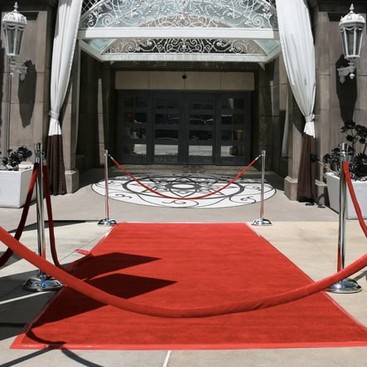BLOGS How to Break Into Event Planning

3Source: The Muse

Ever wondered how to get started working in PR, entertainment, finance, or another profession? Over the next two weeks, we’re putting together a guide to breaking into these cool fields and more, brought to you by those who know it best. Keep checking in for an inside look at how to launch your dream career!
Planning events for a living sounds like a dream—picking food and décor, working with tons of different people, spending your days at cool venues instead of behind a desk. But it takes more than just a love of a great party to succeed in this fast-paced field—you’ve got to have an eye for detail and an ability to handle constant deadlines and pressure.
We sat down with two professional event planners (who, yes, love their jobs) to learn more about what it takes to break in.
Jennifer Carver
Managing Director, University Events, University of Southern California
Brief Description of Job: I manage the day-to-day operations of the University Events team, providing strategic guidance and creative direction, and ensuring thatall events produced through our office extend the presidential standard of hospitality and promote the University and its goals. My department produces a wide variety of events including those involving the President of the University and high-level donors, conferences, gala dinners, and alumni events.
Years of Professional Experience: 9
Why did you choose this field?
I knew I would never get bored! I needed to find something that would keep me on my toes and wouldn’t get monotonous. I wanted a career that was fast-paced where I would be doing something different each day and not stuck behind a desk 40 hours a week. Event planning allows you to work on such a wide variety of projects and no two are exactly the same. Even if you’re planning an annual event, it’s always a challenge to continue to improve it and make it better than it was the year before.
What did you want to do in college?
In college I was all over the map. I knew what I didn’t want to do, but I had trouble narrowing down exactly what I did want to do. I was interested in so many different areas. At one point I thought about going into law enforcement, I debated psychology, PR, marketing, and working in the entertainment industry. Ultimately I decided to major in Mass Media Communications and Political Science. Both were somewhat broad and I felt I could utilize those skills no matter what I ended up doing. I just wanted to be prepared when the right opportunity presented itself. Fortunately, my strategy worked!
What was your first job in this field, and how did you land it?
My first “real” job out of college was at MGM Studios as an assistant in the Consumer Products and Marketing Department. I considered myself very lucky to land a job at a studio so early in my professional career. (This, of course, was after about six months of part-time jobs including serving in a restaurant, working for a catering company, and even telemarketing for two weeks to help pay the bills!)
I got in by applying to be in the studio’s temp pool. Though it wasn’t always consistent full-time work, it allowed me to meet people within the company, work in various departments throughout the studio, and discover the areas I enjoyed the most. After two months of numerous different assignments, I was placed into the assistant position as a temp and hired on full-time about a month later.
Though event and meeting planning was just a small part of my job, I was exposed to trade show preparation and planning as well. My desire to become an event planner grew from there and I knew that was the direction I wanted to take my career. Working at MGM Studios was a great experience, and after two years there I was hired by Pepperdine University as an Event Coordinator.
What advice would you have for someone breaking into your field?
Gain experience wherever you can. Find ways to get involved with event planning, build a resume, and start a portfolio. Even if you work in a completely different field, you can volunteer with a local nonprofit and help to plan a fundraising event, or offer to help coordinate an outing or holiday party for your company. Gaining experience will also give you a better perspective of what it takes to plan an event from start to finish and be sure it’s really something you want to do. It’s not always as glamorous as it appears and there is a lot of pressure involved, but it is incredibly rewarding to see your hard work come to fruition and create a wonderful experience for your guests.
Director of Communications and Events at a Venture Capital Firm and Co-Founder of Conway Amling Strategies and Events
Brief Job Description: At the venture firm, I coordinate all aspects of events, from networking and business development events to summits and investor conferences. I also handle marketing, PR, social media, and investor relations. With Conway Amling, it really depends on what our client wants—we will plan entire events or simply do day-of logistics. We can also develop and implement public relations and media campaigns for our clients.
Years of Professional Experience: 6
Why did you choose this field?
I started off working in the communications and development department of a nonprofit. In the fall of 2008, due to the economy, the organization had to make some staff cutbacks, including its fundraising events person. So I took over planning our annual auction for scholarships.
I was in over my head, and the event took a lot of long hours and begging, but when I saw the amazing results (we were able to raise over $100,000 for scholarships), I was hooked. It didn’t hurt that I’d grown up in the headmaster’s house at a private school—my family had about 20 events a year held at our house for fundraising or welcoming new parents, so I got used to networking, helping caterers, and setting up events at a very early age. Making it my career felt natural.
What has been the most surprising thing about working your field?
The perception of being a “party planner.” Whenever I tell people what I do, their response is always the same: “That’s so fun, I wish I had a job where I could just go to parties.” Unfortunately, that’s not the case. I think I’ve only been able to even attend 50% of the events I plan—normally I’m either working the check-in table or overseeing it. Usually, you’re so busy making sure everyone else is having a good time and things are going as planned that you don’t have anything to eat or drink until 10 minutes before it’s over, and then it’s time to break down the event.
Don’t get into this field unless you’re the person that organizes every happy hour, plans every trip with friends, color coordinates your closet, and gets pleasure out of making a to-do list. It’s not all about picking out tablecloths and flowers; it’s a lot of data and detail, too.
What advice would you have for someone breaking into your field?
There are so many charities and nonprofits that need volunteers for their events, and being a volunteer gives you invaluable experience. These organizations want to raise the most money possible, so they need a low overheard when throwing events—and the best way for them to do so is by not paying for staff. Working an event, whether it’s sitting at the check-in table, procuring silent auction items, or helping spread the word to get attendees, is all easy experience to get if you’re willing to work for it. And an added bonus is that you’re helping to do some good at the same time.
What is different about the hiring process in your field than in other fields?
One of the advantages to this field is that you have ownership over getting experience. In most other careers, you’re at the mercy of a firm to hire you to help you get experience or at the mercy of getting a graduate degree or passing a certain test. But if you can walk into an interview with 10 events under your belt—even if you were an unpaid volunteer at each one—you’re steps ahead of your competitors.

